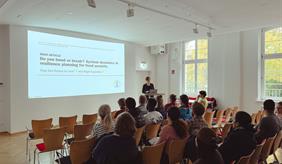14.10.2025

On October 10, 2025, Professor Birgit Kopainsky, director of the System Dynamics Group at the University of Bergen, Norway, delivered an insightful guest lecture at ZALF on using System Dynamics to study food system challenges in an ever-changing world.
System Dynamics is a computer-aided approach for strategy and policy design that helps people make better decisions when confronted with complex, dynamic systems. The method uses simulation modeling based on feedback systems theory, enabling stakeholders to understand system behavior and explore policy options through interactive models.
Professor Kopainsky presented three compelling case studies demonstrating how to use System Dynamics in food system research: an endogenous modeling framework of dietary behavioral change in the FRIDA climate model, resilience planning for food security in Guatemala, and an analysis of food provision and environmental goals in the Swiss agri-food system.
A key strength of System Dynamics lies in its ability to reveal how structure drives behavior in complex systems, helping identify tipping points and leverage points for intervention. "There are no simple solutions for complex problems," Professor Kopainsky emphasized, highlighting the importance of integrated, Systems thinking that challenges assumptions and creates enabling conditions for sustainability to emerge. The lecture showcased System Dynamics as both an analytical tool and a participatory process, demonstrating proven effectiveness in improving communication, learning, consensus-building, and commitment among stakeholders.
